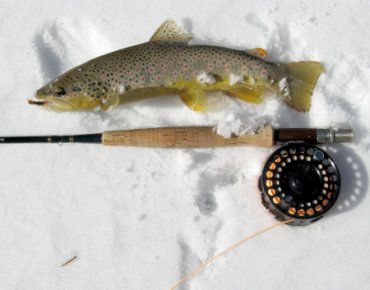ABAJO MOUNTAINS: According to Sergeant J. Shirley, Blanding #4 is open, but receives very little angler pressure, suggesting slow fishing. Blanding #3 is still covered with rotten, unsafe ice. This reservoir has seen very little use all winter. Recapture Reservoir is open for boat launching and shoreline fishing. No report on angler success.
ELECTRIC LAKE: Conservation Officer Casey Mickelsen reports good fishing just off the dam. Anglers are fishing on the bottom with a small green jig, tipped with a worm. Others use a worm by itself. Open water occurs on the north end around the mine water discharge. Springs or isolated pockets of open water may also be encountered. Caution is strongly advised.
HUNTINGTON CREEK: For best success, use fly fishing tackle, floating line and wet fly patterns, such as a size 12 bead head Montana, size 14 bead head hares ear (gray color), and size 12 bead head serendipity (green color).
HUNTINGTON RESERVOIR (MAMMOTH): No recent report. In the past few weeks, fishing has been slow. Most anglers have been using jigs, tipped with minnow or chub meat. Limited parking, combined with snow cover and a thick ice pack, make this water unusually challenging for ice anglers.
HUNTINGTON NORTH RESERVOIR: On February 17, ice had melted along the entire shoreline, according to Volunteer Coordinator Randall Stilson. The ice fishing season is over, but shoreline anglers will have to wait for the ice to recede sufficiently for casting into deep water.
JOES VALLEY RESERVOIR: DWR Sensitive Species Biologist Tony Wright fished last weekend and reported that fishing action was almost dead, except for occasional passes by schooling fish. The most popular end tackle consists of a jig, tipped with chub meat.
LAKE POWELL: Volunteer Coordinator Randall Stilson fished Bullfrog Bay last weekend and reported good fishing for striped bass in 80-120 feet of water. He used a heavy white jighead, and tipped the hook with anchovy meat. Randall suggests dropping the bait to the bottom and tightening the line, when it slackens. Stripers weigh between three to six pounds.
Wayne Gustaveson, DWR project leader, is a good resource for other areas around the lake. Visit http://www.wayneswords.com for his late winter fishing report.
LASAL MOUNTAINS: Mountain access is closed, except by snow machine. Kens Lake has been open since late January. Aquatics Biologist Darek Elverud fished Kens Lake on Sunday and caught eight brown trout in two hours. One measured 20 inches, while the others ranged from 12-16 inches. Darek was using a large silver Vibrax spinner.
LOWER FISH CREEK: On February 2, Tom Ogden caught one tiger and 26 browns, all under 13 inches. Tom fly-fished with floating line and had the best luck with three different fly patterns: a #14 bead head hares ear, #16 bead head prince nymph, and a #12 San Juan worm.
MILLSITE RESERVOIR: Bill Farr of Orangeville fished Millsite on February 16 and caught 70 fish, ranging from 10-16 inches. The majority were rainbows, but included some cutthroats and a few tiger trout. Bill fished near the dam with a white or black jig, tipped with minnow meat. He noticed some open water potholes, due to warm springs at the bottom. Please use extreme caution, while moving around on the ice pack. Except for potholes, the ice thickness seems to be around 10 inches.
SCOFIELD RESERVOIR: DWR’s Randall Stilson has conducted regular creel surveys since the beginning of the New Year. In that time, he has observed very few anglers catching more than one or two fish. Some anglers have even gone home without a fish or even a bite. For most anglers, fishing is extremely slow.
STRAIGHT CANYON: Fly fishermen will have the best success, using floating line and a split sinker to get a wet fly into the deeper holes. Good fly patterns include a #14 bead head hares ear and a #16 bead head prince nymph.
Fishing report for southeastern Utah

"This brown trout was caught by Tom Ogden from Huntington Creek last month on January 13. Fishing continues to be a year long sport for many enthusiasts this year."
